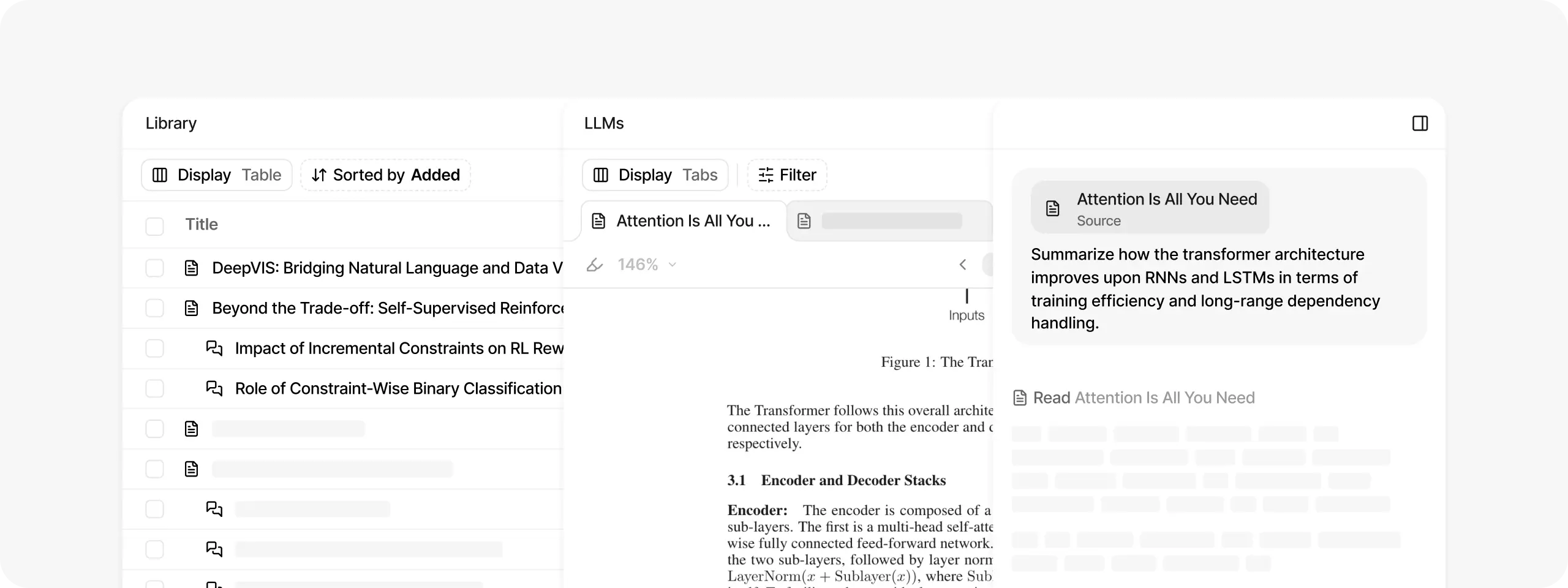Trusted AI reference and citation management tools
Tired of reference managers that break your workflow instead of improving it?
You're not alone.
Researchers everywhere are struggling with expensive tools, outdated interfaces, and citation formatting that still breaks at the worst moments. Mobile apps lag behind desktop versions, collaboration features fall short of modern team needs, and nobody seems to offer the AI-powered analysis that today's research demands.
Whether you're managing 50 papers or 5,000, you'll find here a comprehensive look at current citation management tools, including AI-powered reference managers, how they actually work and what features researchers need to remove friction from their workflows.
1. Anara
Anara combines traditional reference management software with advanced AI analysis of your research materials. It handles all standard reference manager functions, such as importing from Zotero, organizing libraries, formatting citations, and generating bibliographies. But it goes further by analyzing your research papers with AI and highlighting exact sources behind every response.
Unlike traditional reference managers that organize citations from databases, Anara analyzes documents you upload directly (PDFs, videos, audio, images, text) and eliminates hallucinations since the AI can only reference materials you uploaded.
Anara is used by students handling coursework, researchers conducting AI literature reviews, and professionals analyzing large document sets who need fast, accurate insights with complete verification.
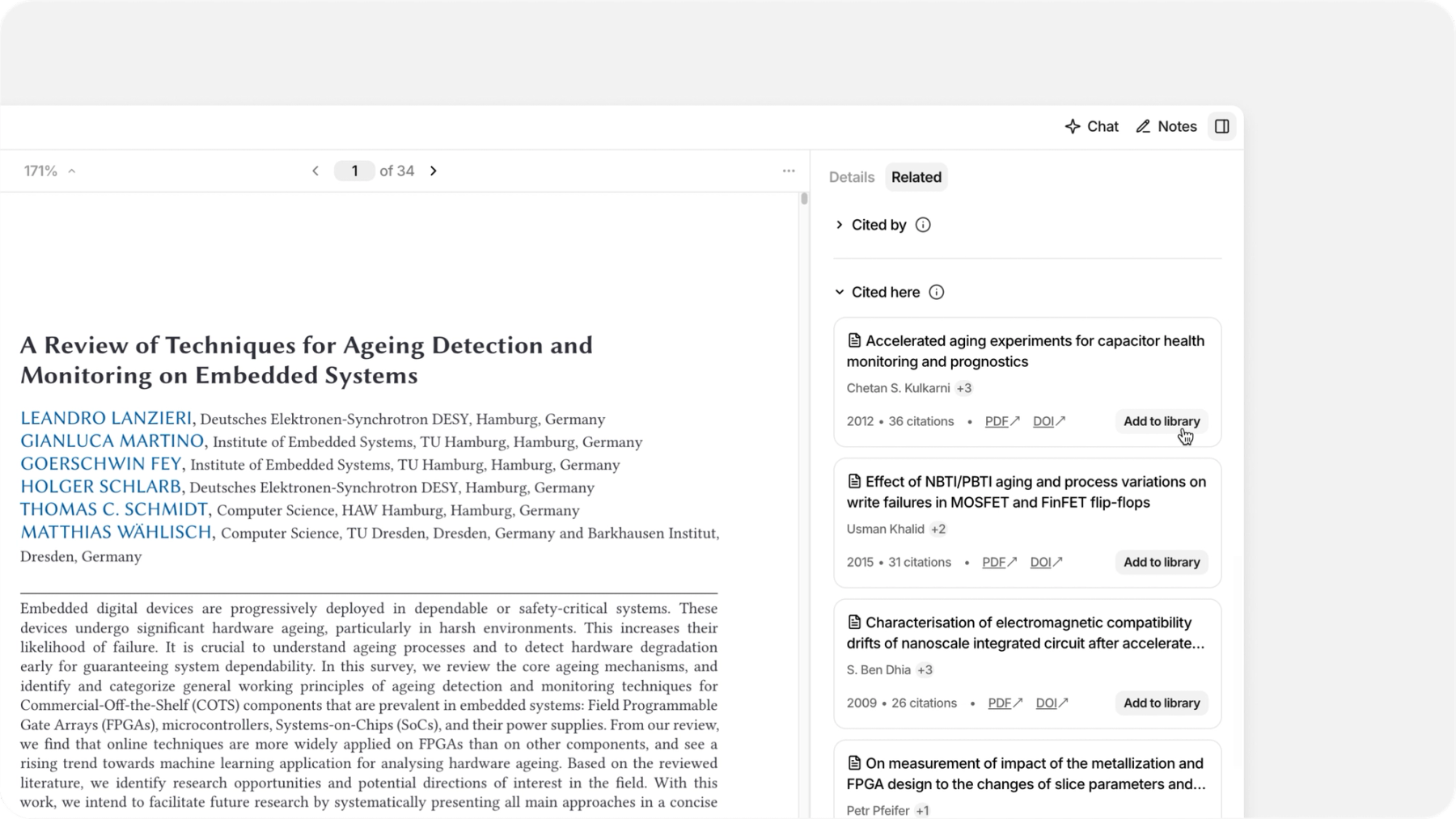
Why researchers choose Anara as their reference manager?
- Verifiable source highlighting: Every AI response links to exact passages in your uploaded documents to fact-check AI responses
- Complete reference management: Import from Zotero, automatic citation formatting, bibliography generation, and export to LaTeX/Word
- Multimedia analysis: Works with papers, lecture slides, videos, audio recordings, and images
- Advanced document organization: Folders, collections, tags, and AI-powered search across your entire library
- Integrated writing environment: AI-assisted writing with automatic citation formatting
- No hallucinations: AI only analyzes your uploaded materials, preventing fake citations
- Real-time collaboration: Shared workspaces for research teams with granular permissions
Anara helps me find the correct citations for information I remember reading. Instead of spending hours tracking down which paper contained specific data, I can locate it instantly.
Chemistry PhD turned Clean Tech CTO
Who is Anara for?
- Students analyzing course readings and lecture materials
- Researchers conducting literature reviews and systematic analyses
- Professional teams analyzing client documents, reports, or technical materials
- Anyone who needs to quickly understand large volumes of documents with verified sources
Pricing:
- Free version available
- Paid plans start at $11/mo on annual plans
Try the reference manager that also analyzes your documents
Get Anara free2. Zotero
Zotero is a free, open-source reference manager that helps users collect, organize, cite, and share research materials.
Zotero remains the most reliable free option with strong browser integration and Word plugin support, making citation management seamless for academic researchers, students, and librarians. While Zotero does not have built-in generative AI, its recent improvements include better PDF annotation and mobile access.
Related: Compare Papers vs Zotero.
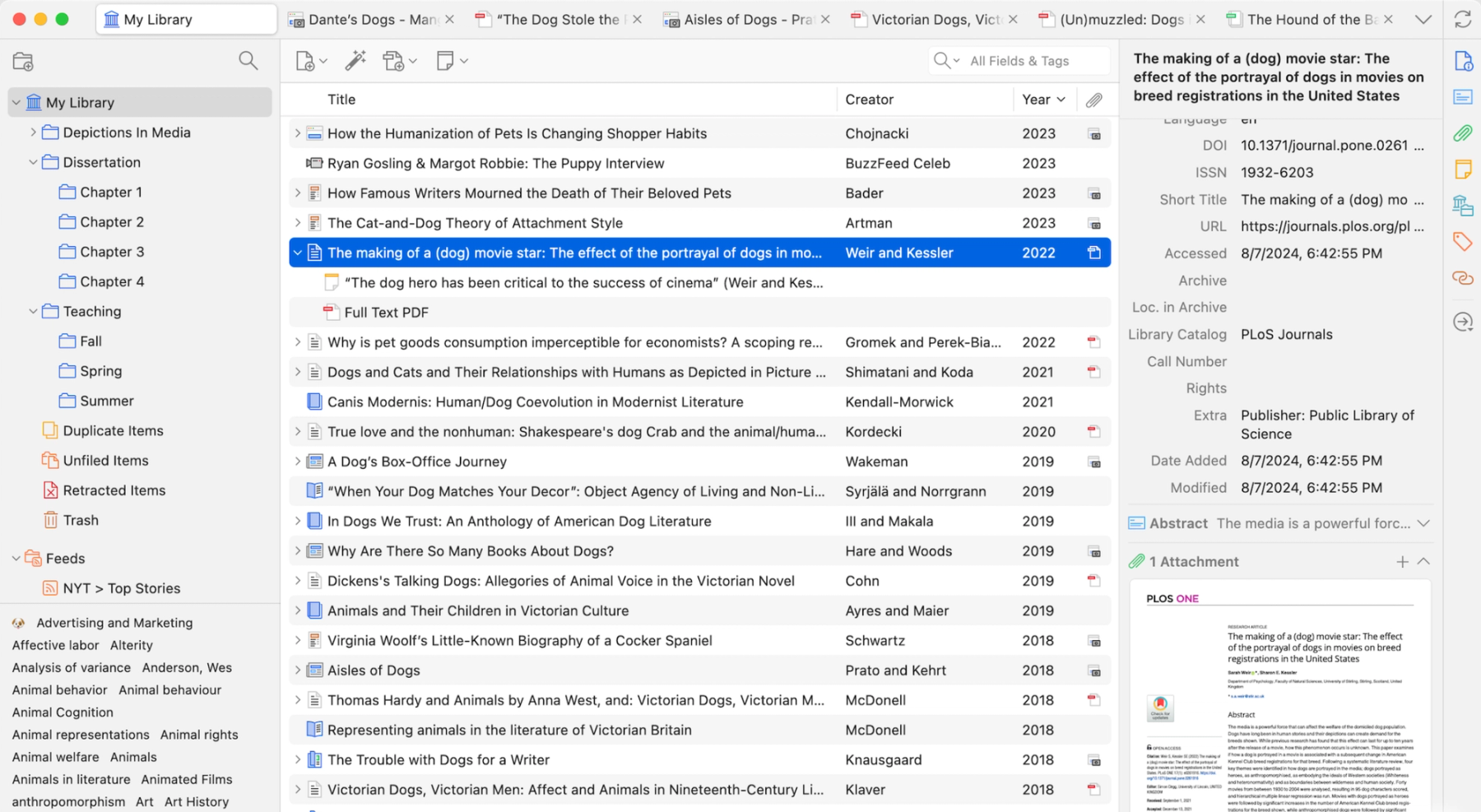
Image source: www.zotero.org
Best features:
- Browser integration for one-click reference saving
- Word processor plugins for in-text citation and bibliography creation
- Tagging, note-taking, and file organization
- Strong community and plugin ecosystem
Limitations:
- No AI features
- Dated interface
- Storage limitations
Pricing:
- Free for up to 300MB storage
- Paid plans: $20/year (2GB), $60/year (6GB), $120/year (unlimited)
Within just four days, I completed writing that would normally have overwhelmed me and caused significant delays.
Medical student using Anara for literature reviews
3. EndNote
EndNote is a robust reference management tool popular among academic institutions and professional researchers. It offers advanced features for organizing large libraries, annotating PDFs, and collaborating on research projects. The latest versions include AI-powered tools for summarizing papers and suggesting relevant citations. While powerful, EndNote's complexity and cost make it less appealing for individual researchers.
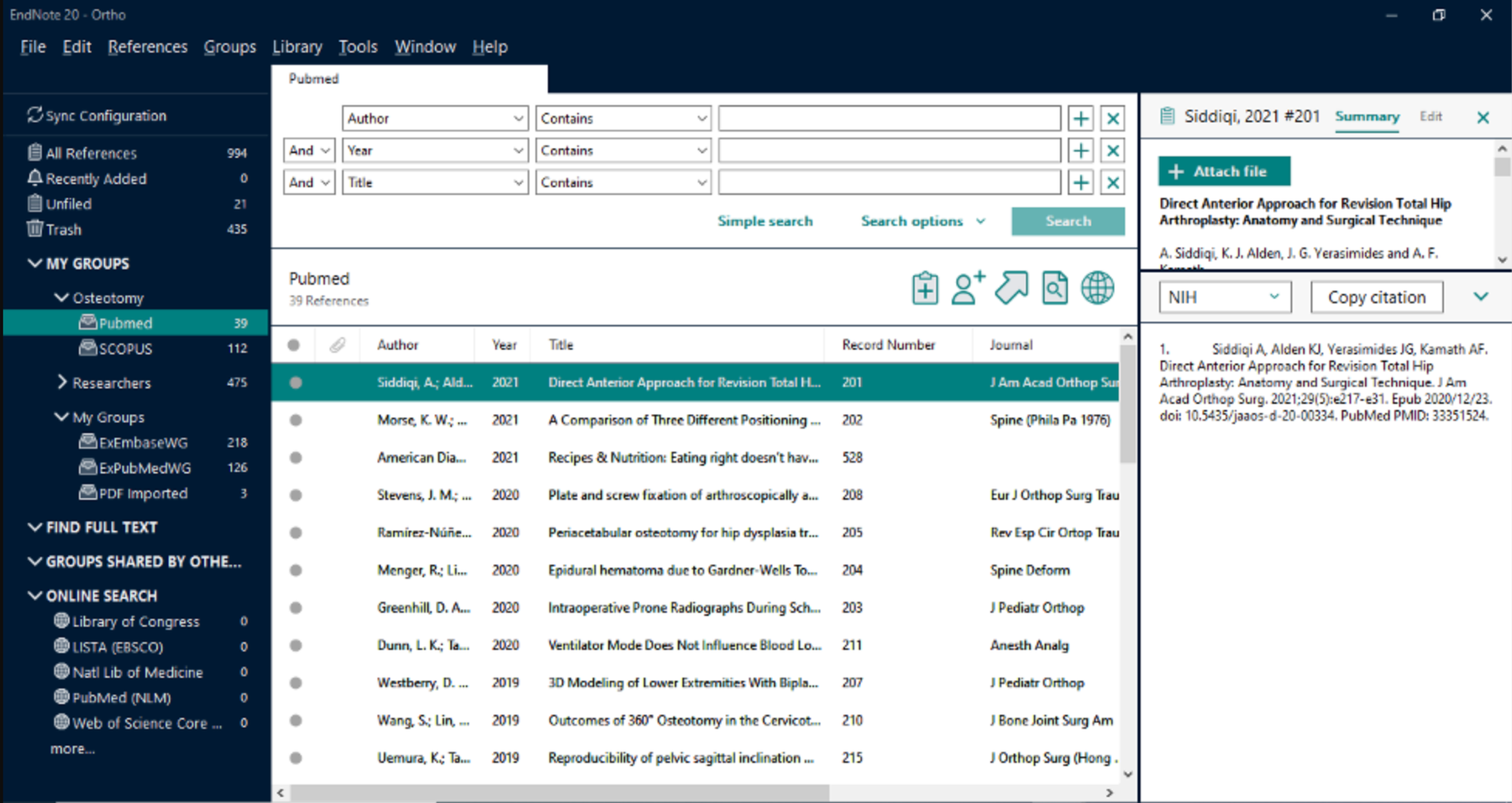
Best features:
- Integration with MS Word, Google Docs, and OpenOffice
- PDF annotation and full-text search
- Shared libraries for team collaboration
- Wide range of citation styles and journal abbreviations
- Strong institutional support
Limitations:
- Expensive
- Steep learning curve
- Frequent plugin issues
Pricing:
- One-time purchase: $125–$275 (full license)
- Student license: from $150
- Free online version with limited features
4. Mendeley
Mendeley is once popular reference manager and one of the main Zotero alternatives. It's also an academic social network but significantly degraded since its acquisition. It enables users to organize PDFs, generate citations, and collaborate in private groups. Mendeley uses AI for PDF metadata extraction and document recommendations.
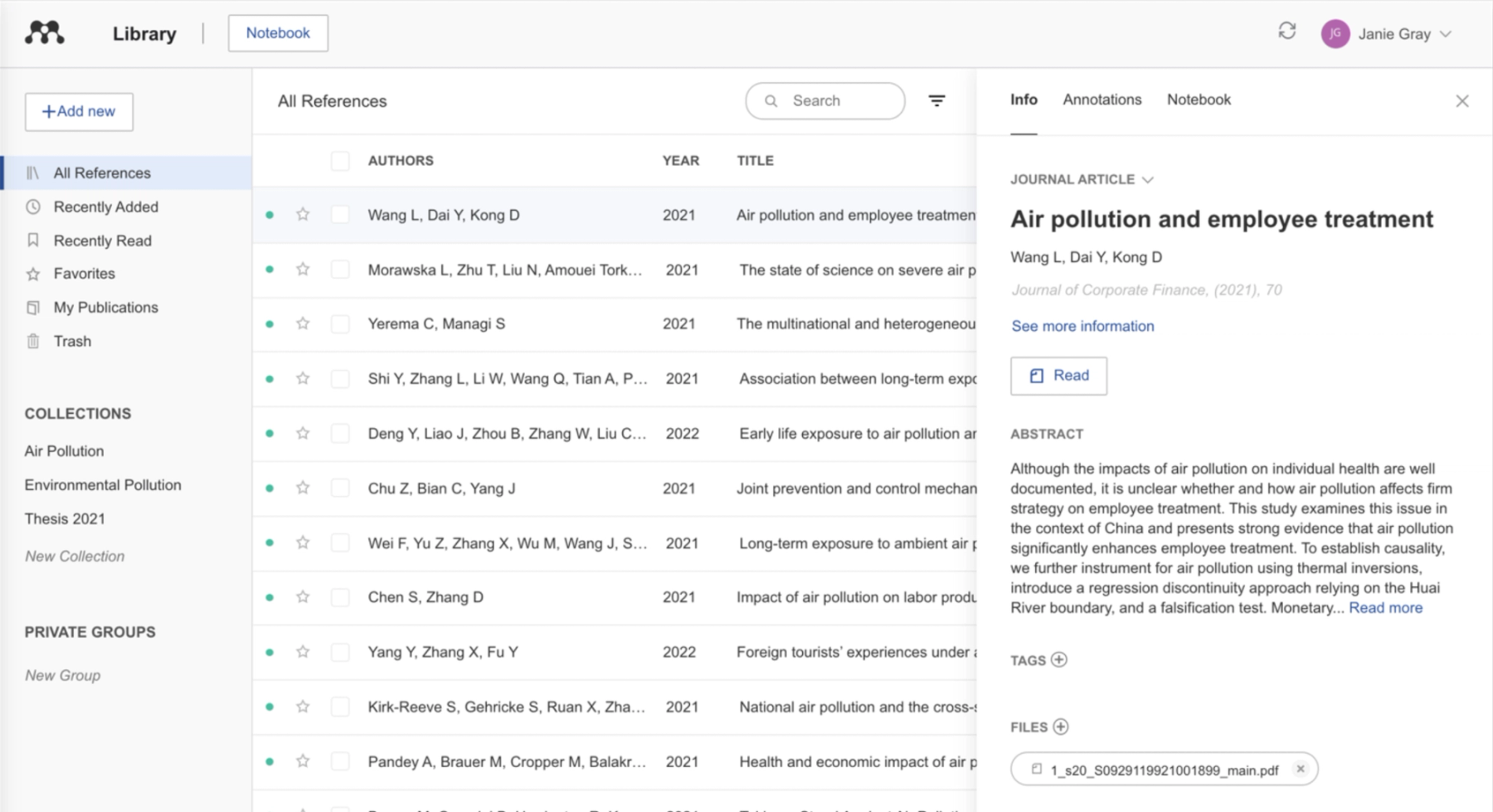
Image source: www.blog.mendeley.com
Best features:
- PDF organization and annotation
- Citation plugin for Word and LibreOffice
- Researcher profile and social networking features
- Group collaboration and sharing
Limitations:
- Removed desktop app
- Reduced functionality
- Occasional sync issues
Pricing:
- Free with 2GB cloud storage
- Paid plans for additional storage
5. Paperpile
Paperpile is a web-based reference manager designed for academics, especially those using Google Workspace. It offers easy import of references, Google Docs integration, and automatic citation formatting. Paperpile uses AI for metadata extraction and citation suggestions.
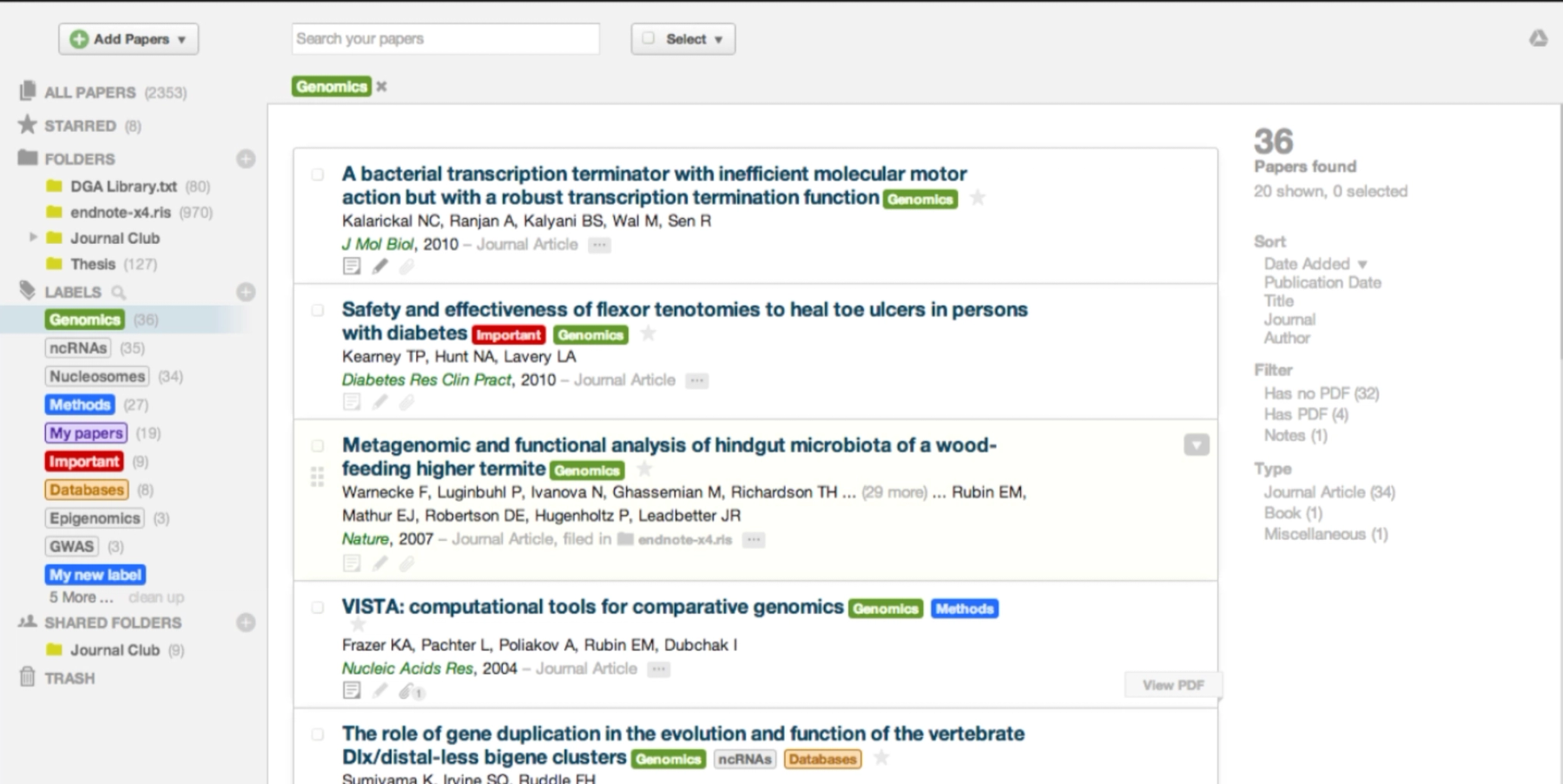
Image source: www.paperpile.com
Best features:
- Seamless Google Docs integration
- Chrome extension for one-click imports
- Automatic citation and bibliography formatting
- Clean, modern design
Limitations:
- Limited to Google ecosystem
- Basic organization features
Pricing:
- Free for one user and two papers
- Paid plans from $2.99/month
Note: Limitations listed above reflect real user experiences shared in researcher communities. For tools with limited user feedback available, we've focused on highlighting their key strengths rather than speculating about potential drawbacks.
6. Citavi
Citavi is a versatile scientific paper management software and knowledge management tool favored by researchers and students, especially in Europe. It combines reference management with task planning and knowledge organization. While it doesn't have generative AI, it automates citation formatting and integrates with MS Word and LaTeX.
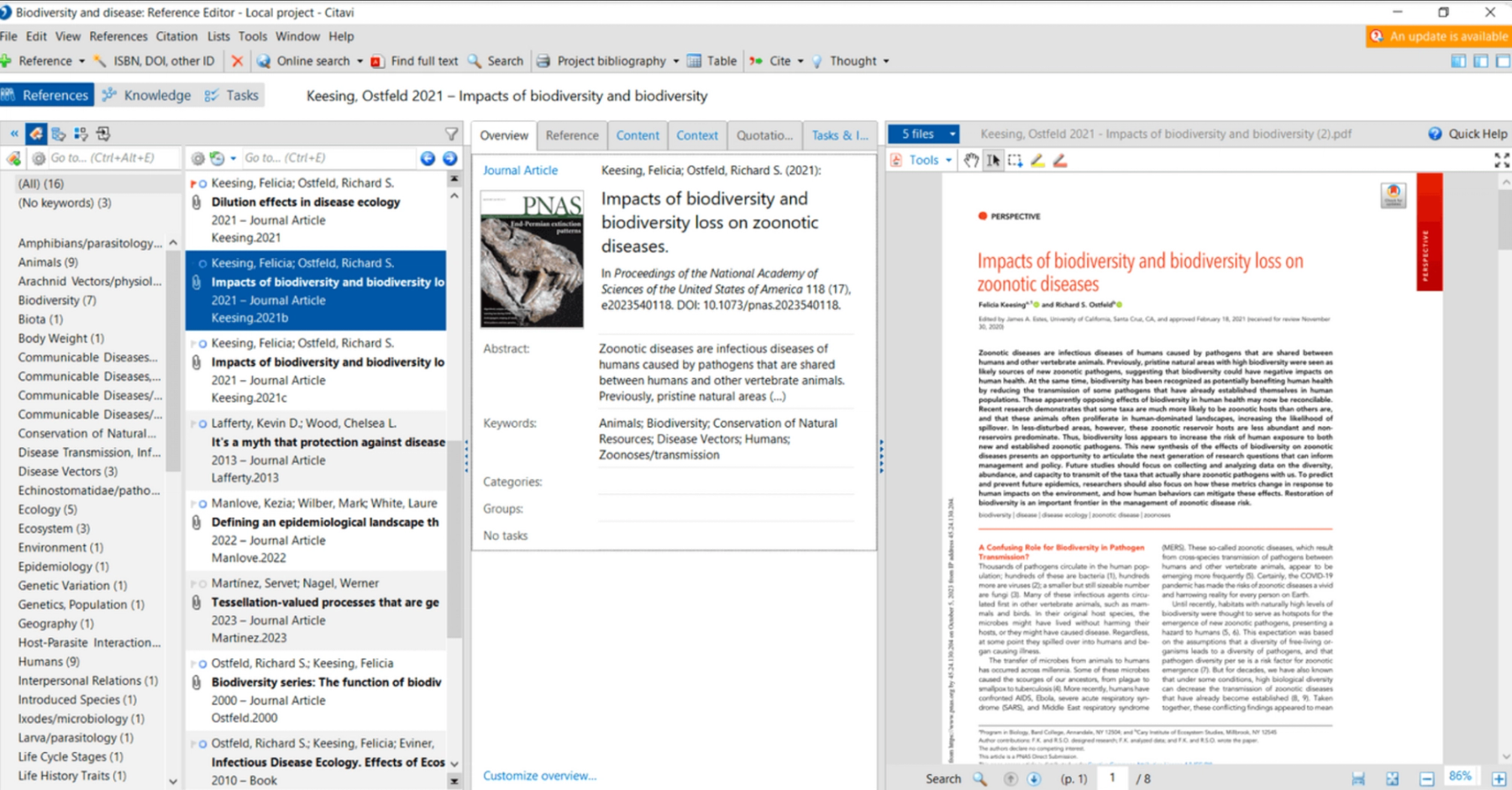
Best features:
- Thematic knowledge organization and task planning
- Over 10,000 citation styles
- Word and LaTeX integration
- Collaborative cloud-based projects
Pricing:
- Free trial available
- Academic: €145/year; Commercial: €254.49/year
Related: The best AI citation generator tools for scientists and academic researchers.
7. RefWorks
RefWorks is a web-based reference manager widely adopted by academic institutions. It allows users to import citations, organize references, and collaborate in groups. RefWorks uses AI for citation formatting and offers tools for research group collaboration.
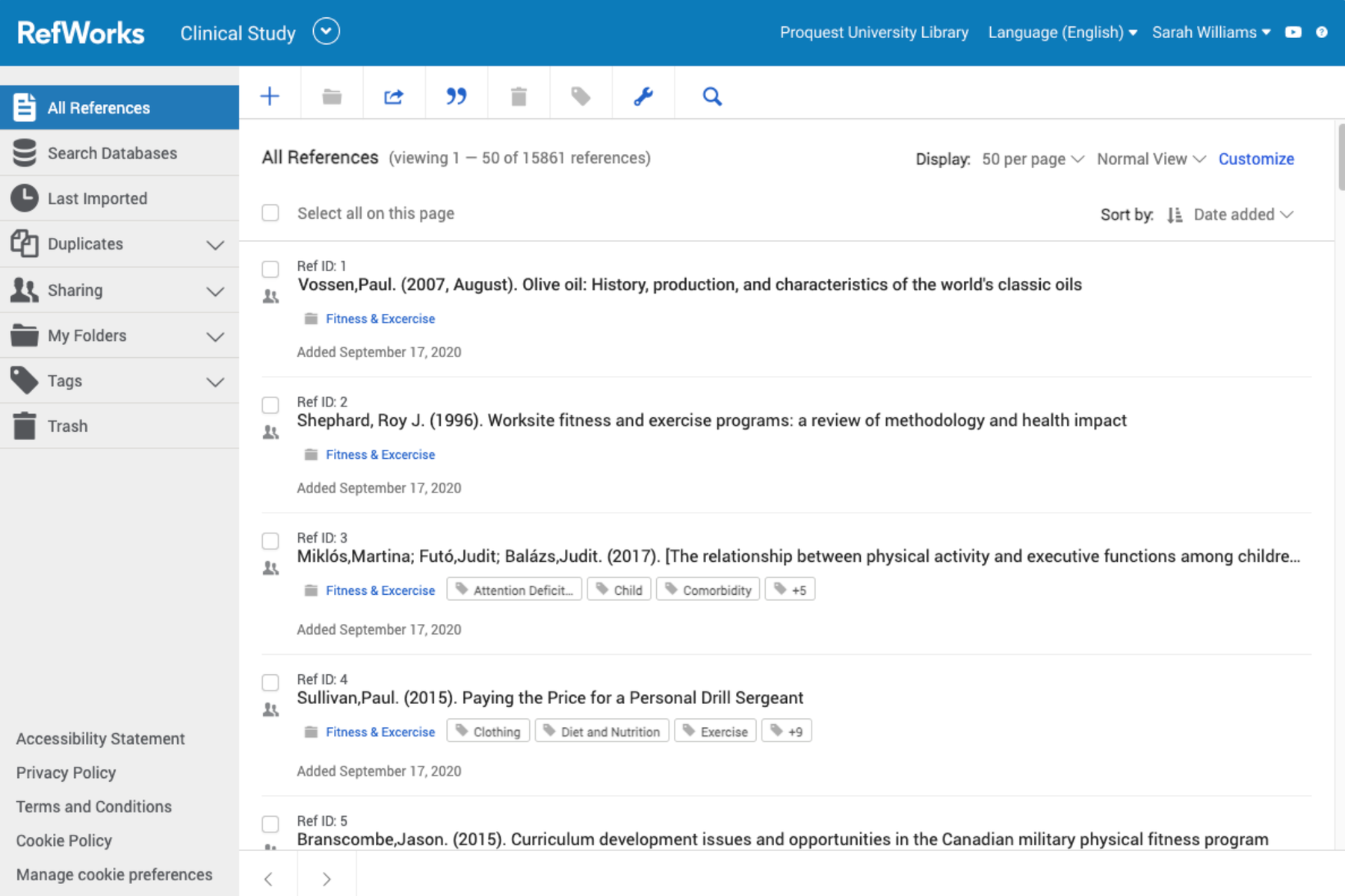
Image source: www.refworks.proquest.com
Best features:
- Web-based access and group collaboration
- Easy import from databases and journals
- Multiple citation styles and export formats
- Integration with word processors
Pricing:
- Free trial available
- Institutional subscription or customized quote
8. Petal
Petal is an AI reference manager that leverages GPT-based AI for dynamic interaction with research libraries. It offers automatic metadata extraction, advanced search, and AI summarization and translation. Petal is used by scientists and research teams seeking AI-powered literature management.
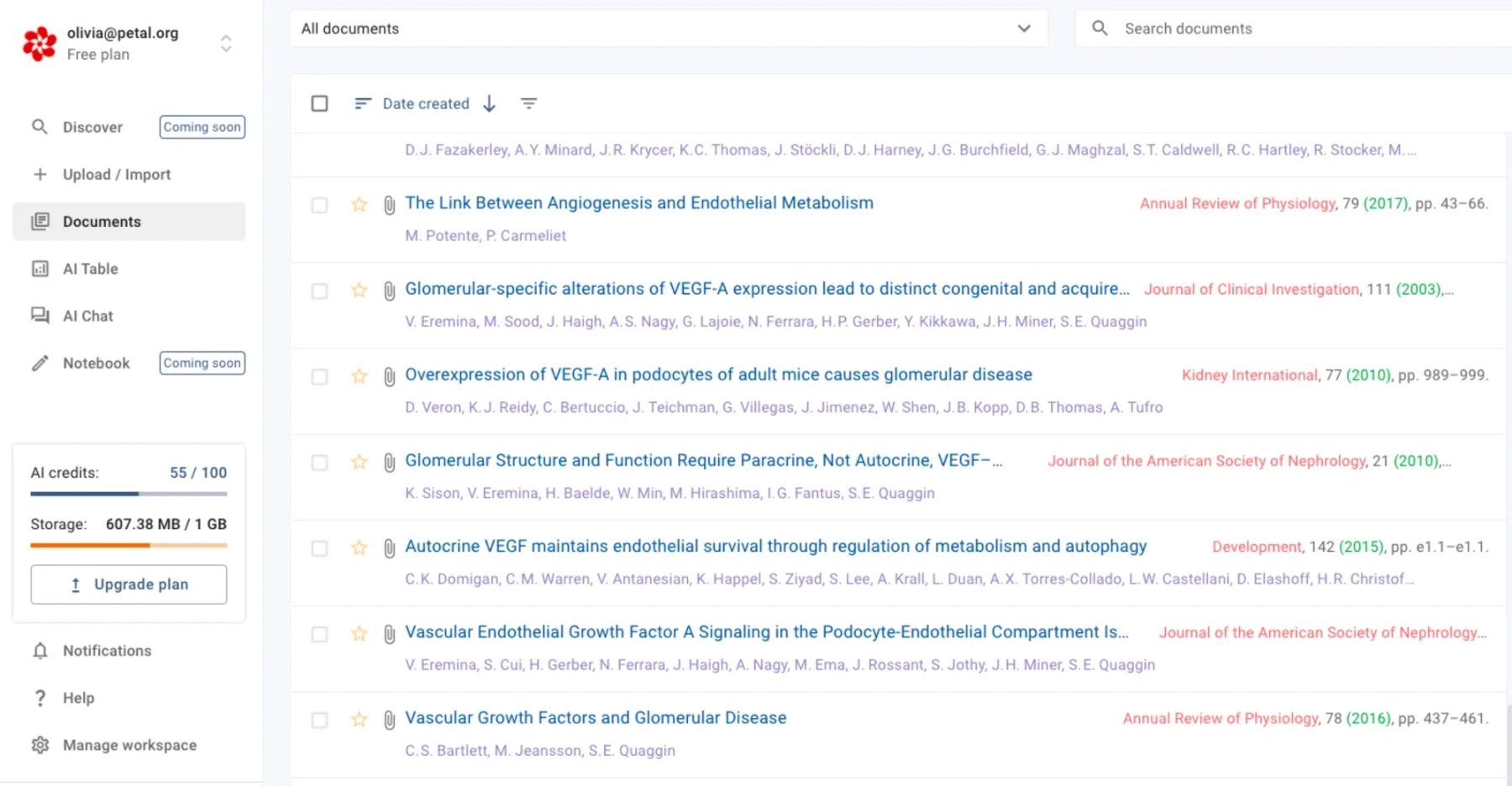
Image source: www.petal.org
Best features:
- AI-powered summarization, translation, and explanation
- Full-text and advanced search across 200M+ articles
- Collaborative annotation and commenting
- Word Add-in for direct citation while writing
Pricing:
- Free version available
- Contact for premium plans
9. Docear
Docear is an open-source citation manager that integrates mind mapping, note-taking, and PDF management. It is ideal for researchers who want a holistic approach to organizing literature, notes, and drafts. Docear uses smart algorithms for PDF annotation extraction and organization.
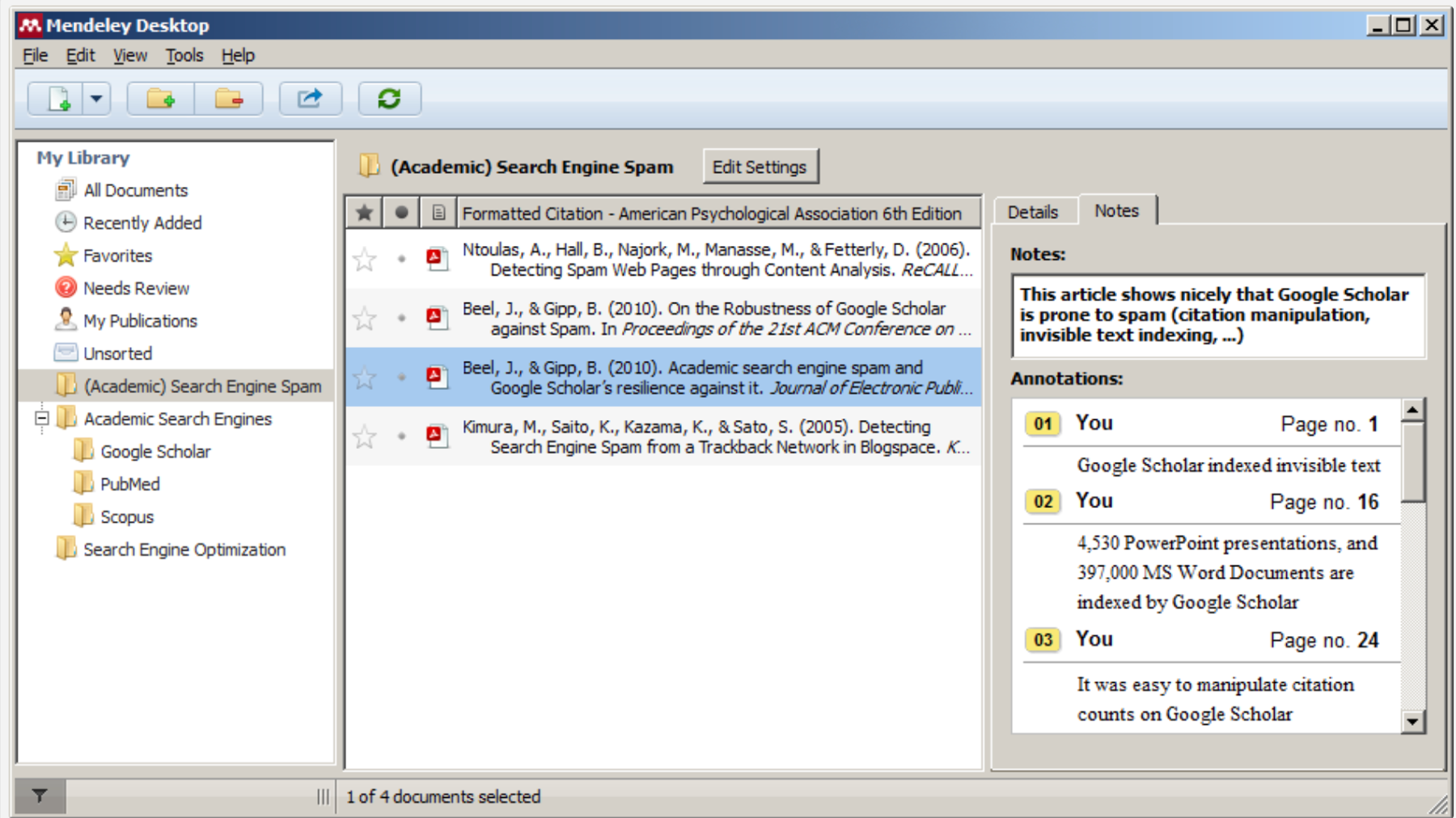
Image source: www.docear.org
Best features:
- Mind mapping for literature and ideas
- PDF annotation extraction and management
- Note-taking and project organization
- Open-source and customizable
Pricing:
- Free and open-source
Ready to move beyond organizing citations? See how Anara understands your research
Get Anara freeFAQ
Which reference manager works best for graduate students?
Graduate students need tools that handle long-term projects (3-7 years), committee collaboration, and thesis formatting. Anara and Zotero both offer strong collaboration features, while EndNote provides robust institutional integration. Consider your university's preferred citation styles and IT requirements.
Do these tools offer automated referencing features?
Most modern reference managers provide basic automation: Zotero auto-imports metadata from web pages, and EndNote offers automated duplicate detection.
AI citation managers take automation much further. Anara automatically extracts citations from uploaded PDFs and prevents hallucinated references. Anara's upcoming agentic AI for literature review will automate entire research workflows.
How do AI-powered citation managers prevent fake citations?
Traditional AI tools like ChatGPT can generate fake citations. AI-powered reference managers like Anara analyze documents you upload, making fake citations impossible. Petal uses AI for summarization but still requires manual citation verification.
What's the difference between citation management and research management software?
Citation managers focus on organizing references and formatting bibliographies. Research management tools handle the entire workflow: project planning, collaboration, data analysis, and timeline tracking. Anara bridges both by combining reference management with document analysis and team collaboration.
Do these tools work on mobile devices?
Mobile support varies significantly. Zotero offers a mobile app for basic functions, Mendeley has limited mobile access, and Paperpile works through mobile browsers. Most advanced features still require desktop access.
Which tool handles institutional requirements best?
EndNote dominates institutional markets with IT support, site-wide licensing, and compliance features. However, many universities also support Zotero (free), and some forward-thinking departments evaluate AI reference manager tools like Anara for research efficiency.
Are there free reference managers?
Zotero remains the best free option with most essential features. Anara offers a free tier for basic use.
What are reference managers?
Reference managers are tools that help you collect, organize, and cite research sources. They store bibliographic data, generate citations in various formats, and integrate with word processors for easy referencing.
How are AI reference managers different?
AI reference managers do all the above but also read and analyze your documents. They let you ask questions, summarize content, verify sources, and identify patterns—turning your research library into an interactive knowledge base.
Why do traditional reference management tools fail?
After analyzing hundreds of researcher experiences, we've identified three critical problems with legacy reference managers:
The legacy tool problem
Many reference managers were built for a different era of research. They can organize citations but fall short when researchers need to understand, analyze, and synthesize information from their sources. Today's researchers need to extract insights, identify patterns, and make connections across large volumes of literature.
The collaboration gap
Modern research is increasingly collaborative, yet most reference management software treat research as an individual activity. Teams struggle with sharing libraries, maintaining consistent citation styles, and building on each other's work without duplicated effort.
Lack of AI integration
While AI transforms every other aspect of research workflows, most citation managers remain purely tools for organizing reasearch. Users want to chat with their papers, get summaries, and extract insights—not just format citations.
How to choose the right citation management tool?
Students valuing cost-effectiveness should start with Zotero which is open source standard literature management software and will cover their basic needs. Those valuing ease of use, AI analysis of course materials, and multimedia support should consider Anara.
For active researchers and Phd students who need advanced analysis, source verification, or large library management Anara might be the best choice due to AI-powered literature review workflows and Zotero integration.
For Google-centric teams research teams Paperpile may be the best choice. However, Anara's collaboration features, shared libraries, and AI workflows make it an attarctive reference management software.
Institutional users with access to IT support and strict compliance rules usually choose EndNote for academic research management software. However, more and more forward-looking departments evaluate emerging AI research tools, too.
Before choosing a reference management software, answer the following questions:
- Do you need AI-powered document analysis? If yes, traditional paper management tools won't meet your needs.
- How important is collaboration? Many tools still treat research as individual work.
- What's your content mix? If you work with multimedia, ensure your tool supports it.
- How large is your library? Some tools struggle with thousands of references.
- What's your budget? Factor in long-term costs, not just initial pricing.
Conclusion
Traditional reference managers served researchers well for organizing citations, but today's research demands more. The most effective tools now combine AI-powered reference management with document analysis, source verification, and collaborative features.
For most researchers in 2025, the choice comes down to sticking with proven traditional tools like Zotero or embracing AI-powered platforms that transform how you manage and interact with your research materials. The decision depends on whether you see reference management as just organizing citations or as a gateway to deeper research insights.
